Ernst Ziller | |
|---|---|
.jpg.webp) Portrait of Ernst Ziller (c. 1880) | |
| Born | Ernst Moritz Theodor Ziller June 22, 1837 |
| Died | November 4, 1923 (aged 86) Athens, Greece |
| Nationality | German, Greek |
| Other names | Ερνέστος Τσίλλερ (Ernestos Tsiller) |
| Alma mater | Dresden Academy of Fine Arts |
| Occupation | Architect |
| Spouse | Sophia Doudou-Ziller |
| Children | Iosifina Dimas-Ziller (1885-1965) |
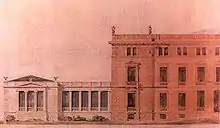
Ernst Moritz Theodor Ziller (Greek: Ερνέστος Τσίλλερ, Ernestos Tsiller; 22 June 1837 – 4 November 1923) was a German-born university teacher and architect who later became a Greek national. In the late 19th and early 20th centuries, he was a major designer of royal and municipal buildings in Athens, Patras, and other Greek cities.[1][2]
Biography
Ziller was born in the rural community of Serkowitz in the district of Radebeul in Saxony. After graduating from the Dresden Academy of Fine Arts in 1858, he went to work for Danish architect Theophilus Hansen. In 1861, Hansen sent him to Athens. In 1872 he was appointed a professor at the Royal School of Arts, now National Technical University of Athens. He was married to a Greek wife, Sofia Doudou-Ziller. His daughter Iosifina Dimas-Ziller (1885-1965) was an impressionist painter.
In 1885, he designed a three-story mansion where his family resided until 1912. Now known as the Ziller mansion, the residence was later acquired by Greek banker Dionysios P. Loverdos (1878–1934). Ziller died in Athens and was buried at the First Cemetery of Athens.[3][4][5][6]
List of buildings
_building_on_the_left_and_the_Megas_Alexandros_(%CE%9C%CE%AD%CE%B3%CE%B1%CF%82_%CE%91%CE%BB%CE%AD%CE%BE%CE%B1%CE%BD%CE%B4%CF%81%CE%BF%CF%82)_building_on_the_right..JPG.webp)

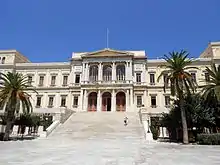

_1872._THE_FOUNTAIN_OF_ERNST_ZILLER%252C_(SYNTAGMA_SQUARE)_1872.jpg.webp)
Below is a list of buildings designed by Ernst Ziller.
Athens
- Andreas Syngros mansion (now Ministry of Foreign Affairs)
- Church of Saint Luke
- Hotels "Megas Alexandros" and "Bakeion", Omonoia Square
- Iliou Melathron (now Numismatic Museum of Athens)
- Mela Megaron
- National Chemistry Institute of Greece (at the University of Athens)
- National Theatre of Greece
- Old building of the Hellenic Military Academy
- Old headquarters building of the National Bank of Greece
- Peloponnese Railway Station
- Presidential Mansion
- Stathatos Mansion
- Thon mansion (destroyed during the Dekemvriana)
- Villa Atlantis
- Loverdo Museum (former Ziller mansion, Academy Street 58a)
Attica
Aigio
- Archaeological Museum of Aigion (old Municipal market)
- Cathedral Church of Panagia Faneromeni
- Church of Esodia of Theotokos
- Church of St. Andrew
Argos
- Municipal Market of Argos
Gytheio
Patras
- Apollon Theatre (Patras)
- Perivolaropoulos mansion
Piraeus
Pyrgos
- Archaeological Museum of Pyrgos (old Municipal Market)
- Municipal Theater of Pyrgos
- Old City Hall
- Railway station of Pyrgos
Syros
- Ermoupolis City Hall
Thessaloniki
- Greek consulate in Thessaloniki (today the Museum for the Macedonian Struggle)
- Metropolitan Church of Saint Gregory Palamas
- Metropolis building
- Theageneio Hospital
Others
Architectural supervision
Gallery

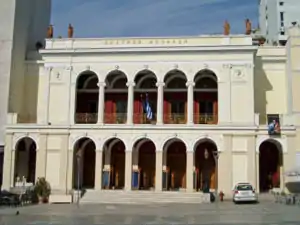
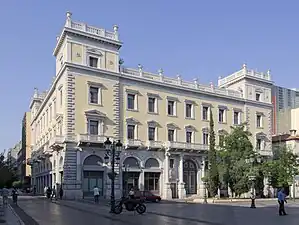 Melas Mansion, Athens
Melas Mansion, Athens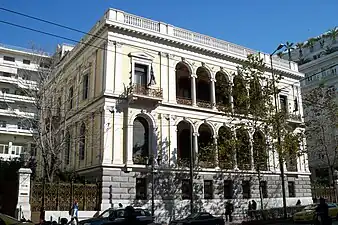
 Metropolitan Theater of Zakynthos (city)
Metropolitan Theater of Zakynthos (city)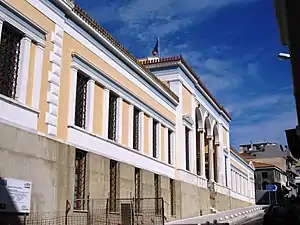 Old municipal market of Pyrgos, Elis
Old municipal market of Pyrgos, Elis_by_Joy_of_Museums.jpg.webp)
 The old headquarters building of the National Bank of Greece
The old headquarters building of the National Bank of Greece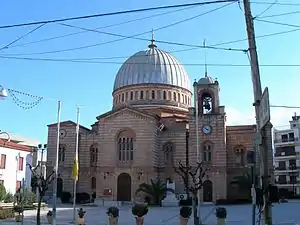 Panagia Faneromeni Church, Aigio
Panagia Faneromeni Church, Aigio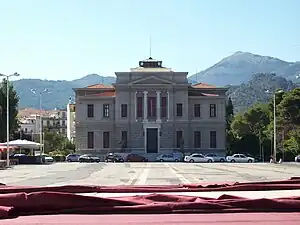 The Court House of Tripoli
The Court House of Tripoli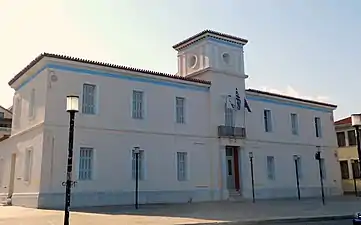 City Hall of Gytheio
City Hall of Gytheio
References
- ↑ "The Architect Ernst Ziller". imma.edu.gr. Archived from the original on June 8, 2020. Retrieved November 1, 2019.
- ↑ Alexandra Koroxenidis. "Ernst Ziller's magnificent architecture". ekathimerini.com. Retrieved November 1, 2019.
- ↑ "Theophilus Edvard Hansen, 1813-91, Arkitekt". Dansk biografisk Lexikon. Retrieved May 1, 2019.
- ↑ "Ernst Ziller biography". presidency.gr. Archived from the original on March 10, 2007. Retrieved November 1, 2019.
- ↑ Ernst Ziller. "The Importance of Being Ernst". portesmagazine.com. Retrieved November 1, 2019.
- ↑ "Ziller-Loverdos mansion was fully restored and opened to public". ered.gr. Retrieved November 1, 2019.
Other sources
- Friedbert Ficker (2003). Ernst Ziller – ein sächsischer Architekt und Bauforscher in Griechenland: Die Familie Ziller Taschenbuc. Allgäu: Der Kunstverlag Josef Fink. ISBN 978-3898700764. (in German)
